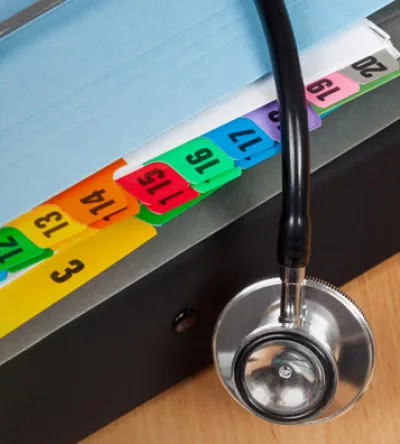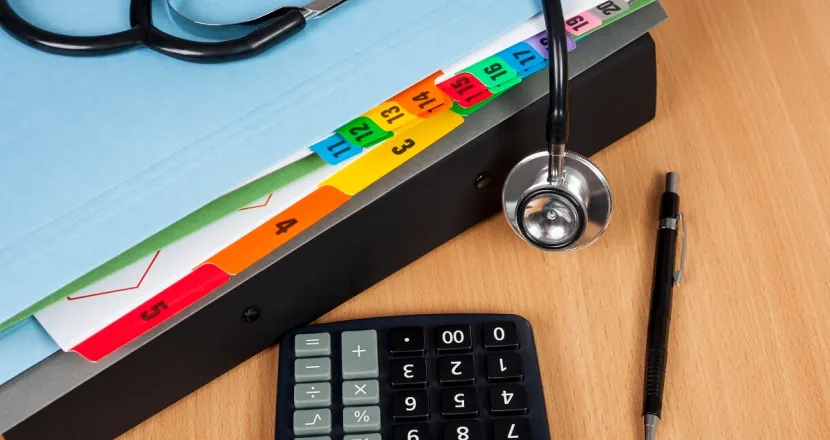Earn a diploma in medical coding and start carving a new career
| Accreditation | Accredited by the Higher Learning Commission |
|---|---|
| Transfer credit | Transfer up to 45 approved credits |
| Format | 100% online coursework you can take right at home |
| Start fast | 6 start dates per year |
| Benefits | Includes training in inpatient (ICD-10), outpatient (CPT) and advanced coding; Certified Coding Specialist (CCS) exam prep |
| QuickPaths | Transfer credit, stackable credentials, and adaptive learning technology build a faster pathway to a higher education with Herzing University |
Learn More Today!

Satisfaction rate
Our overall student satisfaction rate, according to the 2024 Herzing Graduate Survey.
Overview: Medical Coding Associate Degree
The Associate of Science/Applied Science in Medical Coding is a 60-credit undergraduate degree program which prepares you for a career in medical coding. The online degree program provides students with fundamental knowledge and skills in medical terminology, patient privacy, classification of diseases, current procedural terminology coding, insurance adjudication, and much more.

Career-focused curriculum
Discover the crucial knowledge and skills required to succeed in your work and build a foundation for continued career growth.
Flexible schedule
You can take classes during the day or in the evening. We work hard to help you maintain school-life balance, striving to be as flexible as possible for busy non-traditional students.
Virtual services
Access to extensive virtual services, including academic advising, tutoring, support services, technical support and library services.
Lifelong support
We support your ongoing career advancement by providing comprehensive, personalized student services with lifelong career coaching.
Rolling admissions
No application deadlines to worry about. Apply when you’re ready and prepare to get started soon.
Medical Coding Associate Degree Program Curriculum
Herzing University’s online associate’s degree in medical coding program provides students with a thorough understanding of anatomy, physiology, disease processes, and medical terminology.
You'll learn basic and advanced coding methods, principles of patient privacy and ethical conduct, and graduate fully prepared for an entry-level medical coding position.
Advancing Your Education
When greater career options are calling you, we're here to help you advance your Herzing education. You can move from medical coding into management positions in the area of medical records and health information documentation by earning a bachelor's degree in healthcare administration.
| Program | Months i | Credit |
|---|---|---|
| Associate and Associate of Applied Science in Medical Coding | 16 | 60 |
iAverage number of months for students to complete program
Required Courses
All courses, 34.00 semester credit hours, are required.
Required Capstone or Internship
4.00 semester credit hours are required.
** Enrollment in a student readiness training is required two terms prior to internship course. Successful completion of training is required prior to internship course enrollment.
Personal and Professional Development Courses
1.00 semester credit hours are required.
General Education Requirements - Associate
Students enrolled in this program must complete a minimum of 24.00 semester credit hours in general education distributed among the following disciplines. 9.00 Semester Credit Hours in Communications EN 104 – English Composition I EN 111- Information Literacy EN 116 – Speech 6.00 Semester Credit Hours in Humanities HU 140 – Cultural Diversity HU 240 – Introduction to Humanities 3.00 Semester Credit Hours in Mathematics MA 109 – College Algebra 3.00 Semester Credit Hours in Science SC 144 – Introduction to Anatomy and Physiology* 3.00 Semester Credit Hours in Social and Behavioral Sciences PS 101 – Psychology *This requirement is being met by the programmatic science course requirement, SC 144, above.
Distribution of Contact Hours by Course
Distribution of Clock Hours by Course Course or Category Lecture Lab Internship Total Clock Hours Credits HC 101 15.00 15.00 1.00 MO 160 30.00 30.00 60.00 3.00 MO 185 15.00 15.00 1.00 MO 205 45.00 45.00 3.00 MC 120 45.00 45.00 3.00 MC 175 45.00 45.00 3.00 MC 165 45.00 45.00 3.00 MC 265 45.00 45.00 3.00 MC 275 45.00 45.00 3.00 MC 280 45.00 45.00 3.00 MC 285 45.00 45.00 3.00 MC 210 15.00 15.00 1.00 MC 291 OR 60.00 60.00 4.00 MC 294 180.00 180.00 EN 104 45.00 45.00 3.00 EN 111 45.00 45.00 3.00 EN 116 45.00 45.00 3.00 HU 140 45.00 45.00 3.00 HU 240 45.00 45.00 3.00 MA 109 45.00 45.00 3.00 SC 144 45.00 30.00 75.00 4.00 PS 101 45.00 45.00 3.00 PD 202 15.00 15.00 1.00 Totals w/MC291 870.00 60.00 930.00 60.00 Totals w/MC294 810.00 60.00 180.00 1,050.00 60.00
Tuition & Cost
Tuition & Cost
The cost of tuition for the Associate of Science in Medical Coding program is $530 per credit.
You can potentially earn even greater savings by transferring credit from prior college coursework, applying for financial aid, or potential partnership opportunities through your employer.
Our goal is your career advancement. That's why we are always working to improve our curriculum and processes to make our program as affordable as possible while preparing you best for success in your work.
Scholarships & Financial Aid
You may be eligible for multiple scholarships and grants, both through Herzing University and several national scholarship websites.
Military/Veteran Discounts
Veterans, Active Duty U.S. Servicemembers, and spouses may qualify for a 10% tuition discount or tuition reduction to $250 per credit.
Waived Enrollment Fee
Discover the educational pathway designed to maximize your career potential. Reach for greater heights with Herzing University.
What coding certifications will I be eligible for?
Completing the associate degree program in medical coding prepares you for two top industry certification exams, among others:
- Certified Professional Coder (CPC) from the American Academy of Professional Coders (AAPC)
- Certified Coding Specialist (CCS) from the American Health Information Management Association (AHIMA)
Exam prep is included as part of the curriculum. After graduation you will become eligible for several industry certifications.
By getting educated and earning experience in the field you may qualify for further certification in the future.1
Additional certifications
After completing the medical coding degree program, you can also become eligible for several other coding certifications:i
- Certified Coding Associate (CCA)
- Certified Coding Specialist-Physician (CCS-P)
- Certified Outpatient Coder (COC)
- Certified Inpatient Coder (CIC)
i. Preparation for these specific certification exams is not part of our curriculum. But your training can help you qualify for certifications in areas of your choosing.



Medical coding associate degree program enrollment prerequisites
Enrollment requirements for the Herzing University Medical Coding degree program include:
- Hold a high school diploma, GED or equivalent
- Achieve the minimum score on one of several options for entrance testing, including the Wonderlic, ACT or SAT
- Meet with a Herzing admissions advisor
- Complete an enrollment application
If you have any further questions, please contact us and we’ll fill in all the blanks.
- Alabama
- Alaska
- Arizona
- Arkansas
- California
- Colorado
- Connecticut
- Delaware
- District of Columbia
- Florida
- Georgia
- Hawaii
- Idaho
- Illinois
- Indiana
- Iowa
- Kansas
- Kentucky
- Louisiana
- Maine
- Maryland
- Massachusetts
- Michigan
- Minnesota
- Mississippi
- Missouri
- Montana
- Nebraska
- Nevada
- New Hampshire
- New Jersey
- New Mexico
- New York
- North Carolina
- North Dakota
- Ohio
- Oklahoma
- Oregon
- Pennsylvania
- Rhode Island
- South Carolina
- South Dakota
- Tennessee
- Texas
- Utah
- Vermont
- Virginia
- Washington
- West Virginia
- Wisconsin
- Wyoming
- The Virgin Islands
What can I do with an Associate Degree in Medical Coding?
Ranked #29 Best Health Care Job of 2025 by U.S. News & World Report
With the increased demand for electronic health care records and medical treatment in general, the outlook for medical coding jobs is strong. According to the U.S. Bureau of Labor Statistics, national job openings for medical records technicians should grow by over 7% over the 2024-2034 period.
Potential Job Titles
- Coding Specialist
- Department Coder
- Inpatient Coder
- Medical Coder
- Medical Records Specialist
- Outpatient Coder

What about medical billing?
Medical coding and medical billing are separate jobs with unique roles and responsibilities.
Billers and coders work together to facilitate the healthcare revenue cycle. Coders interpret the care provided into the language a computer system can understand, and billers use these instructions to file insurance claims and post payments to accounts.
Develop enough experience in the field and you can potentially earn a larger role in both medical billing and coding—but many students pursue either billing or coding.
Learn more about our associate degree program in medical billing and coding.
Faq
Frequently Asked Questions
Didn't find the answer to your question? Send us an inquiry and we will be happy to answer all your questions!
Medical coders translate the care provided to a patient into codes a computer system can understand. Coders categorize both diagnoses and procedures performed to convert a story of medical treatment into concise codes used for determining the cost of care.
Coders must work closely with physicians, billers and other healthcare personnel to ensure costs are distributed appropriately and claims are filed correctly. Accurate coding helps the business of healthcare run much more smoothly.
You can find an estimate for our medical coding program by using the Herzing University Tuition Wizard.
An affordable, career-focused education is within your reach. You may consider many different options for financial aid, including grants, scholarships, loans or student employment.
Our goal is to best prepare you to become an excellent medical coder who is ready to excel right away in your first entry-level coding job.
While earning a degree/diploma is not always required to earn certain coding certifications, getting educated can help you qualify for more job openings, hit the ground running at full speed and position you best for career advancement.
There are a few primary differences between medical billing and coding and health information management.
Those who work in medical billing and coding, who may be referred to as medical records specialists, play a key role in the healthcare revenue cycle, ensuring Electronic Medical Records (EMR) are assembled accurately and entered into health information systems properly. They communicate with healthcare staff, insurance companies, and patients to best represent services provided (coding) and secure payment for those services (billers).
Health Information Management professionals (sometimes referred to as Health Information Technology – HIT) are responsible for maintaining, analyzing, and optimizing these systems. Their role is more on the backend, emphasizing informatics and Information Technology (IT). These professionals create, manage, and analyze the systems billers and coders rely on to maintain the Electronic Health Record (EHR). They can also play a wider role in data analysis, management, protection, and administration of patient health information.
Technology increasingly influences the evolution of the healthcare industry. Digital coding software called “encoders” can streamline the coding process and have provoked many to wonder about the future of medical coding.
Software can help to reduce the probability of human error but certainly does not replace what a human medical coder brings to the table: ability to decipher human documentation and the reasoning skills to accurately translate them into instructions for billing.
According to the projection from the Bureau of Labor Statistics, employment for medical records and health information technicians (including medical coders) is expected to increase 7% from 2024-2034, faster than the average U.S. occupation.*
Herzing University offers several undergraduate healthcare degree and diploma options that you may earn online, in addition to medical coding and billing:
- Health Sciences
- Healthcare Administration - Associate, Bachelor's
- Health Information Management - Associate, Bachelor's
- Medical Office Administration - Diploma, Associate
- Medical Assisting - Diploma, Associate
Each program is positioned uniquely to build a foundation for you to pursue the type of job in healthcare you’re looking for—whether it’s directly caring for patients, focusing on day-to-day administrative tasks or leading the way in a managerial role.
Yes!
Herzing’s program features 100% online coursework for both the diploma and associate degree options.
The program does include a required research project or internship as part of the curriculum.
You can complete the research project online. If you choose the internship (pending eligibility in your state), you will be able to gain experience in a real working environment to best prepare you for your first entry-level job as a medical coder.
Yes!
Medical coding is a great career choice for detail-oriented people who work well on their own (a good option for introverts!) and seek a growing career field with opportunities for advancement.
Getting educated is your first step to finding the job you love. Become possible with Herzing University.
Inpatient coding refers to a diagnosis report for patients who require hospitalization and must be admitted for an extended stay. Inpatient coding uses Internal Classification of Diseases, Tenth Revision (ICD-10) coding systems.
Outpatient coding refers to reports outlining services for patients who aren’t required to be hospitalized, typically those who are released within 24 hours. Outpatient coding uses Current Procedural Terminology (CPT) coding systems.
Inpatient and outpatient coding also deal with unique payment and reimbursement systems you will need to be familiar with.
You may learn inpatient and/or outpatient coding depending on whether you choose the associate degree or diploma path.
According to the Bureau of Labor Statistics (BLS), medical records specialists earn an average salary of $48,310 per year ($23.23 per hour).*
Learn more about how much medical coders and billers can make, including a state-by-state breakdown and averages for different types of certified professionals.
Program Finder
Associate and Associate of Applied Science in Medical Coding
On Campus OnlineTo learn more about this program, click the Request Info button.
The Student Experience at Herzing
My classes helped prepare me for my career goals and were geared toward learning about everything that I need to know for a career in medical coding.
Sarah Brede
Healthcare Student | Kenosha CampusI realized attending this program was the best choice I could have made, and am very happy I did it. I cannot wait to start my career!
Ashley Ferro
Healthcare Student | New Orleans CampusI’m still amazed at all the different codes that I’ve learned about!
Quanteria Jones
Healthcare Student | Online CampusI love my instructors and the staff at the Herzing University. Their help and encouragement is what helped me achieve my degree. At the age of 54, who knew that I had this kind of potential? Herzing did, my family and friends did, and finally I did after I saw what I could do. Herzing is the best, and I am possible!
Cherryl R. Shields
Healthcare StudentI was tired of low-paying, dead-end jobs. I wanted more out of life and I wanted to set a good example for my children. I chose to study medical billing and coding at Herzing University because I have healthcare experience and wanted a career in a growing field.
Natasha Spieth
Healthcare Student | Online CampusAccreditation & Disclosures
1. Certification in this program is not a state requirement.
Herzing University is accredited by the Higher Learning Commission (hlcommission.org), an institutional accreditation agency recognized by the U.S. Department of Education.
* BLS pay estimates calculate the median annual wage for various occupations. Per the BLS the median wage for an occupation is: "The wage at which half of the workers in the occupation earned more than that amount, and half earned less. Median wage data are from the BLS Occupational Employment and Wage Statistics survey." Bureau of Labor Statistics (BLS), U.S. Department of Labor, Occupational Outlook Handbook 2024. BLS median wage estimates do not represent entry-level wages and/or salaries. Multiple factors, including prior experience, age, geographic market in which you want to work, and degree level and field, will affect career outcomes, including starting salary and earnings as an experienced employee. Herzing neither represents that its graduates will earn the median salaries calculated by BLS for a particular job nor guarantees that graduation from its program will result in a job, promotion, particular wage or salary, or other career growth.
Recent Blog Posts
Waived Enrollment Fee
Discover the educational pathway designed to maximize your career potential. Reach for greater heights with Herzing University.







